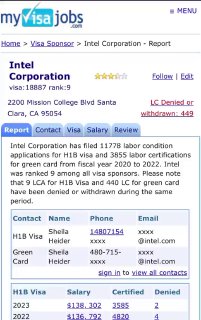U.S. Tech Workers (@USTechWorkers)
Despite getting all the foreign workers they wanted through the H-1B visa program, Intel continues to crater as a company.
Despite Intel’s efforts to bring in foreign workers through the H-1B visa program, the company continues to struggle and face significant challenges. This raises questions about the effectiveness of relying on foreign talent to address workforce needs.
The H-1B visa program allows U.S. companies to hire foreign workers in specialty occupations, including technology and engineering roles. Intel, like many other tech companies, has utilized this program to fill gaps in its workforce and bring in skilled individuals from around the world.
However, despite having access to a diverse pool of talent through the H-1B visa program, Intel has faced ongoing issues and setbacks. The company has experienced a decline in market share, financial performance, and overall competitiveness in recent years.
This raises concerns about the effectiveness of relying on foreign workers to drive innovation and success within the company. While diversity and inclusion are important principles in the tech industry, simply bringing in foreign talent may not be enough to address systemic issues and drive meaningful change.
Furthermore, the ongoing challenges facing Intel highlight the need for a more comprehensive and sustainable approach to talent management and workforce development. Simply bringing in foreign workers through visa programs may not address underlying issues related to culture, leadership, and organizational strategy.
As Intel continues to face difficulties and struggles as a company, it is important for stakeholders to reflect on the effectiveness of their talent acquisition strategies and consider alternative approaches to building a strong and competitive workforce. This may involve investing in training and upskilling programs for current employees, fostering a culture of innovation and collaboration, and reevaluating the company’s overall business strategy.
In conclusion, the case of Intel highlights the complexities and challenges of relying on foreign workers through the H-1B visa program. While diversity and inclusion are important values, simply bringing in talent from abroad may not be a silver bullet solution. Companies must consider a more holistic approach to talent management and workforce development in order to thrive in today’s competitive business environment.

